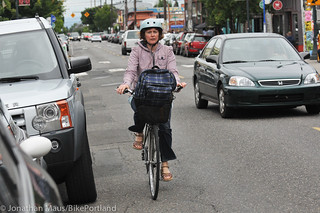
(Photo: J. Maus/BikePortland)
(Publisher’s note: This week we’re excited to highlight a few of the projects created by students in Portland State University’s Traffic and Transportation course. As we reported in a profile earlier this year, the class has had a vast impact on Portland in numerous ways by churning out over 1,200 smart and inspired graduates since 1991. We worked with class assistant Rebecca Hamilton (a graduate herself who now works at Metro) to share three of the projects that will be presented by students in class later this week.)
Parking Benefit Districts – a project by CT (who requested anonymity)
Parking plays a big role in how places develop. And as we all know, the amount of parking in a neighborhood or commercial district directly impacts how it feels to walk and roll through. CT points out that cities can also choose to manage parking in a way that creates revenue for safety projects and programs that encourage non-driving travel options. Here’s more about CT’s work on what are known as “parking benefit districts.”
What’s your big idea?
Parking Benefit Districts. For neighborhoods that implement residential and other types of parking permits and parking meters, they should get most (51-100%) of the parking revenues back to the neighborhood. The parking revenues can be used for transportation demand management (e.g. transit or bikeshare passes) and/or small infrastructure improvements (e.g. crosswalks, flashing beacon, curb extensions, etc). The goal is to manage on-street parking resources and enhance safety and transportation choices for neighborhoods.
Here’s what that might look like conceptually…
Advertisement
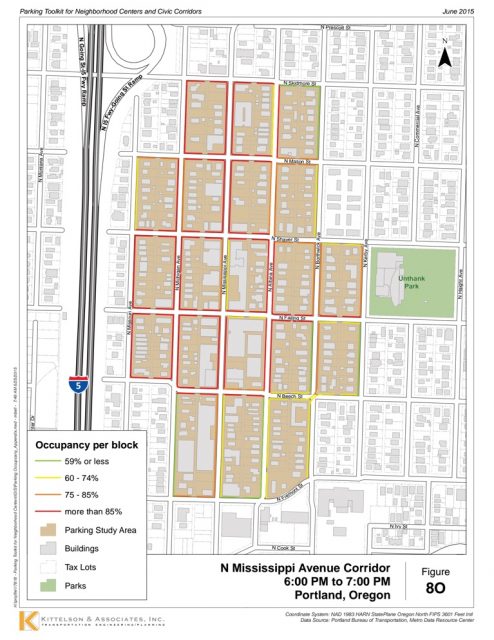
What steps are you taking to make it happen? Have you made any progress towards your goal?
Many of my neighbors are interested in parking management tools to address parking spillover from new development and commercial corridors. My project will depend on the long-waited residential permit program. So the first step is having a residential permit program in place. Then I will talk to neighborhood residents and businesses and gather their support for a parking benefit district. I will also talk to PBOT staff to understand how a parking benefit district may be set up in a neighborhood like Boise (in northeast Portland). Lastly, I want to help the neighborhood to work with PBOT to develop consensus on what kind of improvements and programs can be paid for by parking revenues.
What have you learned about trying to make a change in your community? Has anything surprised you?
People don’t like change, even if it’s for the better. The key is helping people understand the trade-offs change can bring. No one likes to pay for parking, but if that means it can help making our neighborhood safer, more walkable, and less congested with cars, people might be willing to do it. One thing that surprised me is that There is an exceptional level of passion and activism among our residents. In Portland, you don’t need to have a planning or engineering background to have great ideas for improving your neighborhood and the city.
This is the first in a series. Stay tuned tomorrow for Amy Wren’s project that focuses on improving biking and walking routes to Bridger Elementary School.
— Jonathan Maus, (503) 706-8804 – jonathan@bikeportland.org
BikePortland is supported by the community (that means you!). Please become a subscriber or make a donation today.



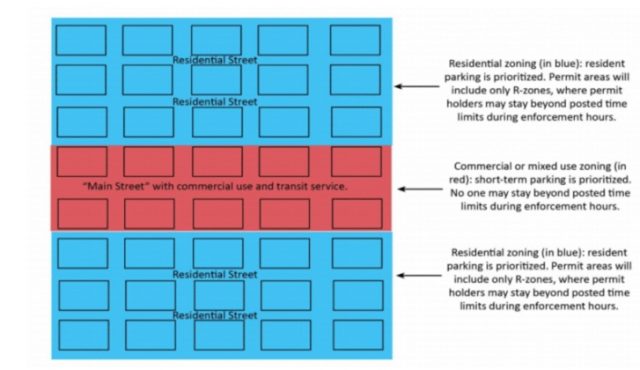
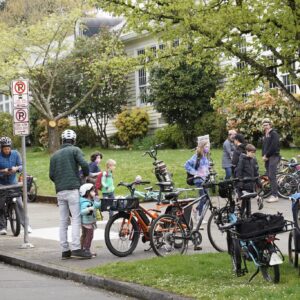
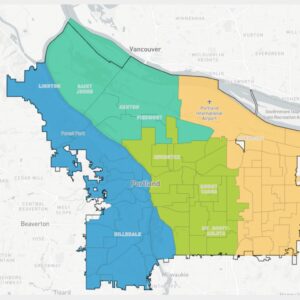
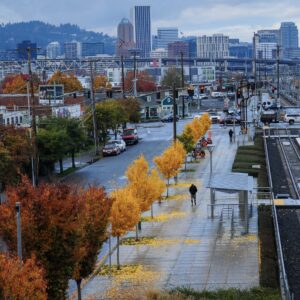
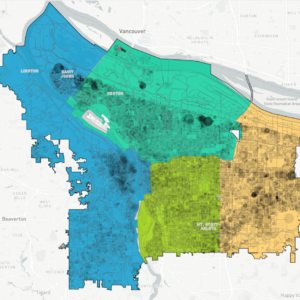
Thanks for reading.
BikePortland has served this community with independent community journalism since 2005. We rely on subscriptions from readers like you to survive. Your financial support is vital in keeping this valuable resource alive and well.
Please subscribe today to strengthen and expand our work.
so much discussion about parking…
I’d just install parking meters throughout the entire city… nobody parks for free anywhere except their own property… the great equalizer…
But what about apartment dwellers with no options other than street parking, you insensitive clod!?
/sarcasm
I would love to lease a the parking spot in front of my residence; I’d gladly pay for the privilege of parking there, and I’ll happily pay market rates for it. But the city won’t take my money.
Auto Owners get really worked up over parking spots. A lot of the posts on our local Reddit are about folks who rabidly try to enforce unwritten rules about the spaces in front of their houses. Passive aggressive notes, calls to the city, verbal altercations with other drivers who merely want the same thing as they do.
When the rack is full outside of the place I’m going, I just lock to a signpost, or ask “how long are you staying?” and maybe buddy up with someone. It’s an experience that is a minor inconvenience at worst, and at best a chance to meet people in a positive way.
Bikes = Connect you with your neighbors, and environment in a positive way.
Cars = Make me feel like the world is constantly taking from me, my time, my money, my joy, my connectivity. They cause many problems in an attempt to solve just one. They really are toxic, and not just emissions!
Cars may only solve one problem, but then so do bikes. And it’s really a different problem than the one bikes are suited for.
I disagree. Cars can be a part of solving the mobility “problem”, as are bikes, but bikes are also part of the solution to social isolation, sedentary lifestyle health issues and community security (you really can’t see what’s happening from behind the windshield).
Meanwhile, the average speed of the average car over its lifetime is just under 25 mph. The median trip distance is about three miles. It sure looks like both bikes and cars solve pretty much the same transportation “problem”, although one does it without creating so many other problems like death, destruction and poisoning people.
Cars tend to work better than bikes for longer trips, inclement weather, carrying loads, traveling with passengers, and for people who are unable to walk or ride for whatever reason.
I agree that cars are not ideally suited for all short urban trips, even if many people use them that way (just as people use bikes in suboptimal conditions).
I also agree there are societal costs to cars that do not apply to bikes, and I would love to live in a city where they are not seen as necessary by the great majority of residents. Sadly, I don’t, and probably never will.*
*For the purposes of this statement, I lump robot cars and regular cars together. I may well live in a city where human-driven cars are the minority.
I’m really looking forward to robocars. I feel like I can really bully them around because they are programmed not to hit me.
Well the cars will have video evidence of you violating traffic laws. Only a matter of time before the police get roped into tracking down the worst offenders. With robo cars everywhere, there will be cameras everywhere. License plates or someone pursuing you won’t be needed to follow you to your downtown office.
Ah those unwritten rules about parking in front of someone else’s house. We used to call that being civilized. It was considered impolite to park in front of a house that wasn’t yours or that you weren’t going into for a visit. Of course such etiquette comes from a period in which one car per house or fewer was the norm, not today’s one car plus per adult, so it was easier to comply.
It’s nice that many of the negative aspects of those days are gone, but I do miss some those little considerations we all used to engage in for the sake of communal peace and social standing. They included not short-cutting through residential areas and keeping the sidewalks and gutters clean and clear.
I wanted guaranteed parking for my car after years of not having to worry about street parking in front of my house. So I cleaned out my garage and park it there now. Problem solved.
Charlie’s proposal would do three things, as far as I can see.
First off, it would resolve the issue of requiring parking by ensuring that residents of “parking free” buildings don’t park in the residential zones, thus making the cost of parking explicit, and re-internalizing the cost of parking to the developer, which is good.
Second, it will provide money for the neighborhood to spend on small transportation fixes.
Third, it will lead to a bunch of people complaining about the inherent unfairness of the proposal, and that it discriminates against renters (it’s untrue, but won’t stop people). Alternatively, people will complain it discriminates against poor people who now need to buy a permit they would have previously not needed.
If the renters on the commercial streets are not allowed to purchase the parking permits on the adjacent streets, how are they not being discriminated against? The commons are being rented to an elite class relative to the hoi polloi, which I would call discrimination.
If there’s a market for on-street parking places, everyone should be allowed to participate in that market. Otherwise, it’s privatization.
This rule, like many others, discriminates between commercial zones and residential zones. Another relevant example is that people who build in R zones must provide off-street parking, whereas those in C zones, for the most part, do not.
People who needed parking could rent/buy in buildings where it was available; since developers are claimed to have some magical ability to accurately gauge the market and build exactly what the market demands, they will supply enough parking, with the threat of lowered rents (or prices for condos) if they don’t. Developers are causing the parking shortage, so should bear the cost of addressing it, which this policy would encourage them to do. In short, it encourages developers to internalize their costs.
The “hoi polloi” (which includes many renters and people with modest incomes) will continue to muddle along as they always have, but will now have a new parking fee to pay, a form of development tax borne by current residents.
This year’s top projects will be presented to an expert panel on Thursday December 1st starting at 6:40 PM in the Portland building Room C (just next to the auditorium). The panel will consist of PBOT Director Leah Treat, Citizen Activist Chris Smith, and someone from the transportation commissioner’s office. Always very interesting. Anyone is welcome to attend.
If you want to read more about Parking Benefit Districts read the article by the guru – Donald Shoup- about them here. http://www.accessmagazine.org/articles/fall-2016/
Charlie is a great person and we are lucky to have him advancing parking reform here in Portland. As a resident (and home+car owner) of the Mississippi area, I look forward to a sensible permit system. I also anticipate backlash by regressive business owners and vehicle owners who insist on their right to store their property for free on public property.
I hope household income can be taken into account when deciding on pricing for permits, as many of the long-time resident of the neighborhood are understandably baffled by the values of many newer residents. Thank you Charlie for your courage and perseverance in the fight ahead.
I would expect that one concern that business owners might have about a meter district is the possibility that driving customers might desert them for Alberta, or Williams, or other neighborhood commercial district where the parking is free if not necessarily easy. I have no knowledge of how likely this is, and my instinct is to think “naw, ain’t gonna happen…” – but since I don’t run a small business for my livelihood, that’s pretty easy for me to say.